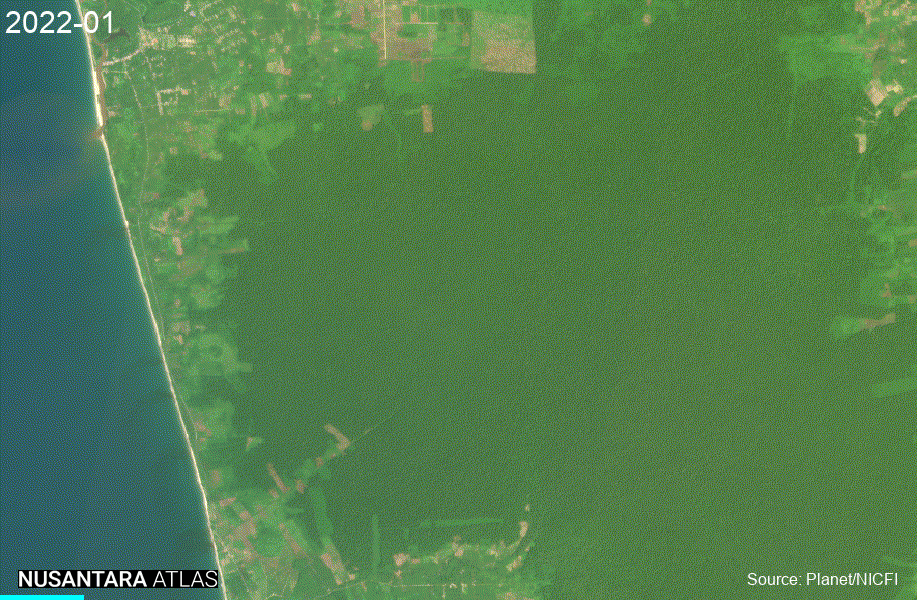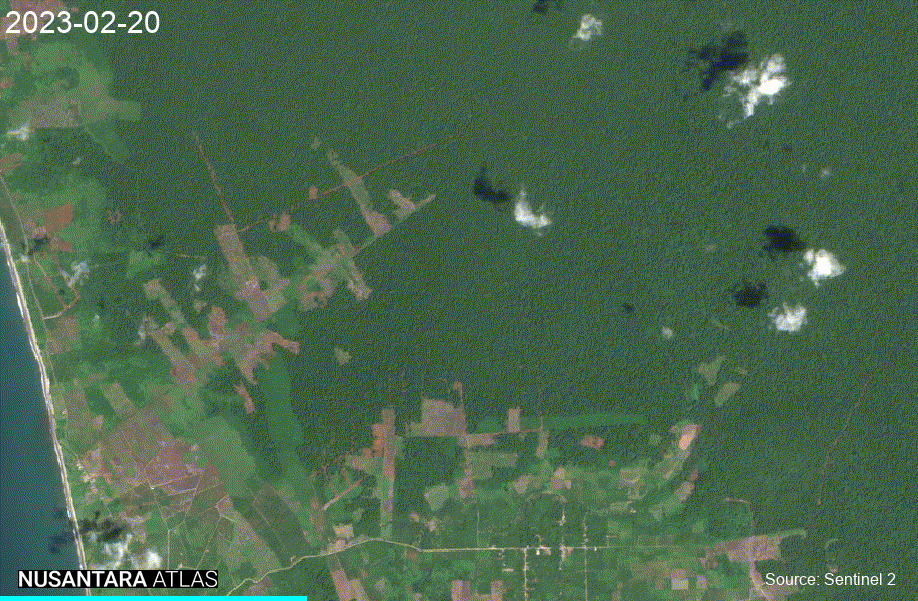Deforestation in peat swamp forests increased in 2022, despite declines reported elsewhere in Indonesia
During the last week, there has been international acclaim for a decline in the destruction of primary forests in Indonesia in 2022. This trend certainly deserves recognition, as it is the opposite of the worrying increases being reported in primary forest loss in other tropical rainforest nations like Brazil, Bolivia, and the Democratic Republic of the Congo. However, Indonesia’s downward trend is not consistent across the nation’s archipelago.
In 2022, some of Indonesia’s most important rainforests within the nationally protected Rawa Singkil Wildlife Reserve in the Leuser Ecosystem suffered a spike in deforestation for new, and illegal, palm oil plantation development. This has included the clearing of primary forests on carbon-rich peatlands that are the home to the highest density of Sumatran orangutans on the planet.
Time lapse footage provided by open source forest monitoring platform Nusantara Atlas shows illegal deforestation for palm oil continued in Rawa Singkil Wildlife Reserve from January 2022 to May 2023.

Planet imagery showing the destruction of peat forests inside Rawa Singkil Wildlife Reserve from January 2022 to May 2023.
The time lapse imagery below shows the forest loss continue into 2023 including surrounding the village of le Meudama that is located in the district of Aceh Selatan––a hot spot of palm oil expansion that was exposed in RAN’s Carbon Bomb Scandals Report as an area producing Conflict Palm Oil that is supplying major global brands such as Procter & Gamble.

Sentinel 2 imagery showing the destruction of peat forests inside Rawa Singkil Wildlife Reserve near the le Meudama village from Febuary to June 2023.
Throughout 2023, civil society organizations and experts have continued to speak out about this worrying trend and have called for an emergency response to address the crisis unfolding in the Rawa Singkil Wildlife Reserve. To date, major brands like Procter & Gamble and Mondelēz and traders Golden Agri Resources and Wilmar International––the companies that have driven the destruction of the peat forests inside the protected reserve and surrounding lowland rainforests–– have not responded to the crisis or scaled up interventions that will deliver a reduction in deforestation in this important carbon sink and the ‘Orangutan Capital of the World.’
Recently, Rainforest Action Network sounded the alarm at the Land and Carbon Lab Summit––the event where the World Resources Institute released its annual figures of primary forest loss to an audience of major brands and traders that consume and produce forest-risk commodities including palm oil, government officials, and the world’s leading providers of geo-spatial data and forest monitoring systems.
It was clear over the 3 days of panel discussions and presentations on emerging geo-spatial mapping tools that it is not a lack of technology hindering efforts to protect the world’s most important forests from deforestation, including those in the Leuser Ecosystem. State of the art satellites and near real-time forest monitoring systems are available and are being used to identify where forests are falling as a result of commodity expansion. The level of precision in forest monitoring tools –and the frequency of deforestation alerts that can be delivered to a company monitoring its supply chains––has improved exponentially in recent times. Given this forest monitoring revolution, we know that brands like Procter & Gamble and Mondelēz are aware of the crisis in the Singkil peat swamp and are simply refusing to act.
The decrease in primary forest loss we have seen in Indonesia in the last few years is good news. In fact, all of us depend on maintaining this downward trend in perpetuity. Due to the scale of the climate and biodiversity crises, the world’s leading conservation body, the IUCN, has issued a policy calling for the immediate protection of the world’s remaining primary forests and an end to the logging and expansion of agriculture into Intact Forest Landscapes (IFLs). The Leuser Ecosystem remains one of Indonesia’s most important Intact Forest Landscapes where we must work together to achieve this goal across the entire region.
Major brands, governments and the palm oil sector must work together to protect the last remaining standing forests in the Leuser Ecosystem and end deforestation for palm oil expansion within this global biodiversity hotspot. We simply can’t afford to turn its carbon dense peat swamp forests into carbon bombs or convert vast areas of its lowland rainforests into palm oil plantations. The fate of the Sumatran orangutan, Sumatran tiger, Sumatran elephant and Sumatran rhino all depend on achieving an end to deforestation in the Leuser Ecosystem.
Dr. David Gaveau speaking about the deforestation crisis in the Rawa Singkil Wildlife Reserve and the impact of the expansion of palm oil into the peat swamp forests on critically endangered Sumatran orangutans.
For nearly a decade, RAN has documented the destruction of primary and secondary forests within the Leuser Ecosystem for palm oil and traced the culprits responsible back to the supply chains of major brands such as Procter & Gamble, Mondelēz, Nestlé, Mars, Ferrero, Unilever, PepsiCo and Nissin Foods. The good news is over the past five years we have witnessed a significant decrease in deforestation across the Leuser Ecosystem landscape. This decline in deforestation is a result, in part, of the rise in compliance of palm oil companies with best practice industry standards adopted by major brands and palm oil traders called ‘No Deforestation, No Peatland and No Exploitation’ (NDPE) practices.
The decline in deforestation in the Leuser Ecosystem in the district of Aceh Tamiang–– which is located in north-east of the Leuser Ecosystem––has been aided by significant investments into jurisdictional and landscape programs funded by PepsiCo, Unilever and their supplier, the palm oil trader Musim Mas. Since 2017, PepsiCo and Unilever have made significant investments into landscape level programs in Aceh whilst their peers have failed to take responsibility for their contribution to the destruction of the Leuser Ecosystem.
It is clear that to protect the Leuser Ecosystem, there is an immediate need for brands and traders to scale up investments in landscape level programs that aim to end deforestation for palm oil especially in the district of Aceh Selatan where the Rawa Singkil Wildlife Reserve is located and is facing an onslaught of deforestation.
The new European Regulation on Deforestation-Free Products also recently came into effect. This regulation will force brands and traders to prove that the products they are importing into the EU are made with ingredients that have not contributed to deforestation since 2020. This regulation will drive change through palm oil supply chains and has the potential to address some of the underlying drivers of deforestation in Indonesia––such as the lack of adequate traceability systems that enable a brand to know where all the palm oil it sources was produced.
The world’s largest palm oil certification system––the Roundtable on Sustainable Palm Oil (RSPO)––is part of the problem. The RSPO provides certified palm oil products using supply chain systems that mix certified and untraceable and uncertified sources of palm oil together. This means that major brands that rely on the RSPO’s Mass Balance system continue to use palm oil from unknown sources––sources they can not trace or prove are free of deforestation. Brands simply can’t rely on certification systems to meet the requirements outlined in the new EU regulation. The pressure is on; the brands––and their suppliers––have 18 months to fully map their supply chains and be able to provide geo-referenced data on the location where all the palm oil they source was grown.
Another major obstacle to achieving deforestation-free supply chains that needs to be overcome by brands in order to comply with the EU regulation is to map the location of legitimate smallholder farmers and to ensure their adherence to no deforestation requirements and inclusion in supply chains. RAN’s Carbon Bomb Scandals Report exposed the failures of the traceability systems currently in use in the palm oil supply chain surrounding the Rawa Singkil Wildlife Reserve. Illegally produced palm oil grown at the expense of peat swamp forests inside the protected area––by local elites claiming to be smallholder farmers–– made its way into the supply chains of major brands. The illegal palm oil was laundered by the local elites via a network of mills that claim to have fully traceable supply chains (100% traceability to the plantation and farm level). Our report proved that the claims made by a number of these mills were fraudulent and, in turn, that the big name brands were implicated in the destruction through their sourcing of the Conflict Palm Oil in question.
In order for deforestation-free pledges made by major brands to be trusted by consumers they must stop basing their claims on unverified claims made by their suppliers. Investments must be made at a landscape level to map supply chains and distinguish family-run smallholder farms from palm oil plantations that have been established on deforested lands by local elites engaging in land speculation.












